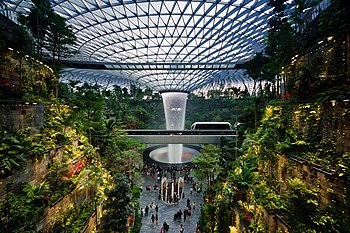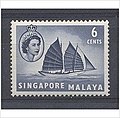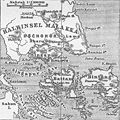
Back بوابة:سنغافورة Arabic Portail:Singapour French Portal:Singapura ID Portal:Singapura Malay Portal:Singapura Portuguese Портал:Сингапур Russian باب:سنگاپور Urdu Portal:新加坡 Chinese
 Map of Singapore Singapore, officially the Republic of Singapore, is an island country and city-state in maritime Southeast Asia. It is located about one degree of latitude (137 kilometres or 85 miles) north of the equator, off the southern tip of the Malay Peninsula, bordering the Strait of Malacca to the west, the Singapore Strait to the south along with the Riau Islands in Indonesia, the South China Sea to the east, and the Straits of Johor along with the State of Johor in Malaysia to the north. The country's territory comprises one main island, 63 satellite islands and islets, and one outlying islet; the combined area of these has increased by approximately 25% since the country's independence as a result of extensive land reclamation projects. It has the third highest population density of any country in the world, although there are numerous green and recreational spaces as a result of urban planning. With a multicultural population and in recognition of the cultural identities of the major ethnic groups within the nation, Singapore has four official languages: English, Malay, Mandarin, and Tamil. English is the common language, with exclusive use in numerous public services. Multi-racialism is enshrined in the constitution and continues to shape national policies in education, housing, and politics.
Singapore's history dates back at least eight hundred years, having been a maritime emporium known as Temasek and subsequently a major constituent part of several successive thalassocratic empires. Its contemporary era began in 1819, when Stamford Raffles established Singapore as an entrepôt trading post of the British Empire. In 1867, the colonies in Southeast Asia were reorganised, and Singapore came under the direct control of Britain as part of the Straits Settlements. During World War II, Singapore was occupied by Japan in 1942 and returned to British control as a separate Crown colony following Japan's surrender in 1945. Singapore gained self-governance in 1959 and, in 1963, became part of the new federation of Malaysia, alongside Malaya, North Borneo, and Sarawak. Ideological differences, most notably the perceived encroachment of the egalitarian "Malaysian Malaysia" political ideology led by Lee Kuan Yew into the other constituent entities of Malaysia—at the perceived expense of the bumiputera and the policies of Ketuanan Melayu—eventually led to Singapore's expulsion from the federation two years later; Singapore became an independent sovereign country in 1965. After early years of turbulence and despite lacking natural resources and a hinterland, the nation rapidly developed to become one of the Four Asian Tigers. With its growth based on international trade and economic globalisation, it integrated itself with the world economy through free trade with minimal trade barriers and tariffs, export-oriented industrialisation, and the large accumulation of received foreign direct investments, foreign exchange reserves, and assets held by sovereign wealth funds. As a highly developed country, it has one of the highest GDP per capita (PPP) in the world. Identified as a tax haven, Singapore is the only country in Asia with a AAA sovereign credit rating from all major rating agencies. It is a major aviation, financial, and maritime shipping hub and has consistently been ranked as one of the most expensive cities to live in for expatriates and foreign workers. Singapore ranks highly in key social indicators: education, healthcare, quality of life, personal safety, infrastructure, and housing, with a home-ownership rate of 88 percent. Singaporeans enjoy one of the longest life expectancies, fastest Internet connection speeds, lowest infant mortality rates, and lowest levels of corruption in the world. Singapore is a unitary parliamentary republic in the Westminster tradition of unicameral parliamentary government, and its legal system is based on common law. While the country is de jure a multi-party democracy with free elections, the government under the People's Action Party (PAP) wields widespread control and dominance over politics and society without much electoral competition. The PAP has governed the country continuously since full internal self-government was achieved in 1959, and currently holds a supermajority with 79 out of 93 elected seats in Parliament. One of the five founding members of ASEAN, Singapore is also the headquarters of the Asia-Pacific Economic Cooperation Secretariat, the Pacific Economic Cooperation Council Secretariat, and is the host city of many international conferences and events. Singapore is also a member of the United Nations, the World Trade Organization, the East Asia Summit, the Non-Aligned Movement, and the Commonwealth of Nations. (Full article...)Selected article - The Parliament of Singapore is the unicameral legislature of the Republic of Singapore, which governs the country alongside the president of Singapore. Largely based upon the Westminster system, the Parliament is made up of Members of Parliament (MPs) who are elected, as well as Non-constituency Members of Parliament (NCMPs) and Nominated Members of Parliament (NMPs) who are appointed. Following the 2020 general election, 93 (currently 87) MPs and two NCMPs from three political parties were elected to the 14th Parliament. Throughout the sitting of Parliament, nine NMPs are usually appointed by the president on a biennial basis. The Speaker of Parliament has overall charge of the administration of Parliament and its secretariat, and presides over parliamentary sittings. The Leader of the House is an MP appointed by the prime minister to arrange government business and the legislative programme of Parliament, while the Leader of the Opposition (LO) is the MP who leads the largest political party not in the government. Some of Parliament's work is carried out by select committees made up of small numbers of MPs. Standing select committees are permanently constituted to fulfil certain duties, and ad hoc select committees are established from time to time to deal with matters such studying the details of bills. In addition, selected backbenchers of the governing People's Action Party (PAP), the current largest political party in Parliament, sit on Government Parliamentary Committees (GPCs) that examine the policies, programmes and proposed legislation of government ministries. (Full article...)Selected picturePhotograph credit: Matteo Morando Jewel Changi Airport is a nature-themed entertainment and retail complex in Changi Airport, Singapore, linked to three of its passenger terminals. Its centrepiece is the world's tallest indoor waterfall, the Rain Vortex, which is surrounded by a terraced forest setting. It houses around 3,000 trees and 60,000 shrubs of 120 species from high-altitude, tropical forest habitats around the world.
General imagesThe following are images from various Singapore-related articles on Wikipedia.
Selected biography -Yip Pin Xiu PJG PLY (Chinese: 叶品秀; pinyin: Yè Pǐnxìu; born 10 January 1992) is a Singaporean backstroke swimmer. She is a five-time Paralympic gold medallist and 5 time World Champion, with two world records in the 50 m backstroke S2 and the 100 m backstroke S2. Yip is Singapore's most decorated Paralympian. Most recently during the Para Swimming World Series Australia 2023, Yip clinched the gold medal in the Women's 100m backstroke multi-class event. She later also bagged her second gold medal in the Women's 50m backstroke on the final day of the competition. (Full article...)Did you know (auto-generated)
In this month
More did you know -
Selected panoramaTanjong Chek Jawa (or Tanjung Chek Jawa or simply Chek Jawa; Chinese: 仄爪哇) is a cape and the name of its 100-hectare wetlands located on the south-eastern tip of Pulau Ubin, an island off the north-eastern coast of the main island of Singapore. Singapore topicsRelated portalsSoutheast Asia Other Countries Tasks
CategoriesWikiprojectsAssociated WikimediaThe following Wikimedia Foundation sister projects provide more on this subject:
Discover Wikipedia using portals |
© MMXXIII Rich X Search. We shall prevail. All rights reserved. Rich X Search































































